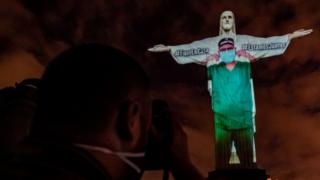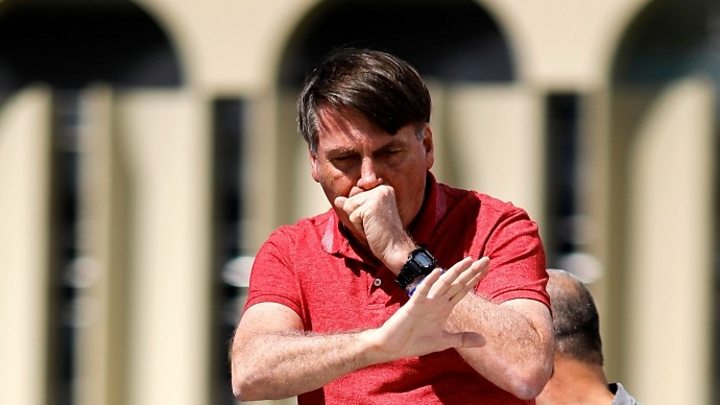This website uses cookies so that we can provide you with the best user experience possible. Cookie information is stored in your browser and performs functions such as recognising you when you return to our website and helping our team to understand which sections of the website you find most interesting and useful.
 Image copyright Getty Images
Image copyright Getty ImagesThe first recorded coronavirus-related death in Brazil happened almost two months earlier than previously thought, researchers say.
Scientists at the Oswaldo Cruz Foundation examined cases of patients taken to hospital with respiratory problems.
They say molecular tests suggest one patient who died in Rio de Janeiro between 19 and 25 January had Covid-19.
The first previously known death in Brazil was that of a man on 16 March.
The scientists also say their research suggests the virus was being spread from person to person in Brazil in early February - weeks before the country's popular carnival street parties kicked off.
According to Johns Hopkins University, which is tracking the disease globally, Brazil now has more than 170,000 cases of coronavirus, second only to the US in the Western Hemisphere.
The World Health Organization (WHO) says the Americas are the currently at the centre of the pandemic.
"Around the world we have seen that the warnings we put out right from the start, very, very early on, were not seen as warnings about a very serious, lethal disease," WHO spokeswoman Margaret Harris said about the high number of cases in Brazil and the US.
Difficult task of tracing outbreak
When Brazil was preparing for carnival, coronavirus had already spread to more than 20 countries. But the sense was that this part of the world was not affected - so why call off Brazil's biggest party and its main tourism draw?
So the arrangements for nationwide street parties and samba parades carried on regardless. Authorities had discussed some contingency plans but beyond that, it was not felt a big enough risk to do anything more drastic.
The idea of cancelling it would be unthinkable, it is so much part of Brazil's soul. Fast forward a few months and those decisions feel like they have been overtaken by events. Crowds of tens of thousands of people, dancing in close proximity are unthinkable in the current climate - even in a country whose president thinks the concern over Covid-19 is all overblown.
But with testing so low in this country, understanding the impact of such an event on the spread of the virus is almost impossible. Many scientists believe the true numbers of confirmed cases are many times higher than official statistics reveal.
In Brazil, far-right President Jair Bolsonaro has repeatedly downplayed the threat of coronavirus and criticised governors and mayors for adopting strict restrictions to curb the spread of the virus.
The country's health ministry has confirmed at least 11,519 deaths related to the virus.

Media playback is unsupported on your device
Health Minister Nelson Teich said he needed more information before he could comment on the research carried out by the Oswaldo Cruz Foundation, which has been published online but not yet been peer-reviewed.
If confirmed, the cases would considerably change the timeline of how the virus spread in Brazil.
The first confirmed case had until now been on 26 February when a 61-year-old São Paulo resident who had visited Italy tested positive for coronavirus.
Brazil is not the only country where subsequent testing has pointed to earlier cases.
Last week, a doctor in France said swabs taken from a patient in Paris on 27 December had tested positive for coronavirus - which would mean that the virus was present in France almost a month earlier than previously thought.
Two weeks ago, a post-mortem examination carried out in California revealed that the first coronavirus-related death in the US was almost a month earlier.
The WHO says it is possible more early cases will come to light and has urged countries to check records for similar cases in order to gain a clearer picture of the outbreak.
Knowing who was the first case is key to understanding how the virus spread.



 Africana55 Radio
Africana55 Radio 
